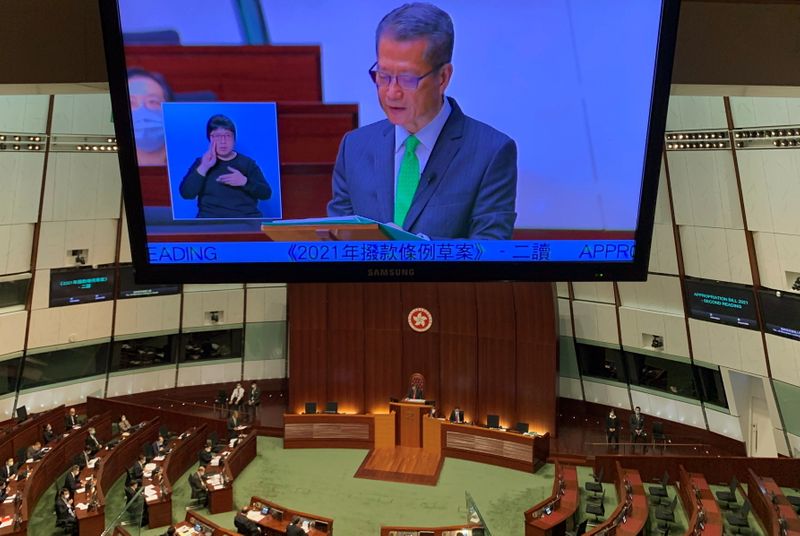By Twinnie Siu and Clare Jim
HONG KONG (Reuters) - Hong Kong plans to run a much lower budget deficit in the coming fiscal year as the economy is expected to recover from its longest recession on record, Finance Secretary Paul Chan said on Wednesday.
The Chinese-ruled city's recovery hopes are now pinned on coronavirus vaccines. Often-violent protests and U.S.-China trade tensions in 2019 had plunged the global financial hub into recession even before the pandemic hit.
Chan told legislators he expected the budget deficit for the upcoming year to hit HK$101.6 billion ($13.10 billion), smaller than the record HK$257.6 billion expected for 2020/21.
The deficits followed a 15-year period of accumulating surpluses.
Kevin Lai, chief economist for Asia ex-Japan at Daiwa Capital Markets, said the budget signalled that Hong Kong was trying to revert to living within its means.
"The overall budget appears generous, but it is tightening in fact," Lai said. "Overall spending is actually a reduction as compared to last year."
Pandemic relief measures, including cash handouts to residents and tax breaks and other benefits to businesses, left the city with a much deeper deficit last year than the planned HK$139.1 billion.
"With the epidemic still lingering, our economy is yet to come out of recession," Chan said in his budget speech. "This year's budget focuses on stabilising the economy and relieving people's burden."
To support a recovery in consumer and business activity, spending in the coming year includes HK$5,000 vouchers to residents, cuts in the profits and salaries tax, and a waiver on business registration fees. The tourism and technology sectors will also receive some support.
On the revenue side, the government will increase the stamp duty for stock trading to 0.13% from 0.1% -- a surprise move which has sent the shares of the operator of the Hong Kong Stock Exchange tumbling.
Hong Kong usually runs balanced budgets or surpluses, since its pegged currency system commits it to fiscal prudence. Its fiscal reserves are expected at HK$902.7 billion at the end of March 2021 and fall to HK$775.8 billion by end-March 2026.
The city's economy was expected to expand by 3.5% to 5.5% this year and run at an average growth rate of 3.3% annually from 2022 to 2025.
Gross domestic product (GDP) shrank 6.1% in 2020, its worst annual performance on record since 1962.
U.S.-China tensions and uncertainty related to how a game-changing national security law introduced last year could affect non-Chinese investment appetite in the global financial hub remain significant risks for the recovery, analysts say.
Hong Kong has allocated HK$8 billion for "safeguarding national security", more than 10 times as much as the money earmarked for boosting the barely-breathing tourism sector and almost two times the amount to be injected in the Innovation and Technology Fund in the coming year.
There is no breakdown on where the national security money goes or timeframe for spending it.

The city begins its vaccine rollout this week, having secured a total of 22.5 million doses of COVID-19 vaccines from Pfizer (NYSE:PFE), Sinovac and AstraZeneca (NASDAQ:AZN), lagging other developed cities.
